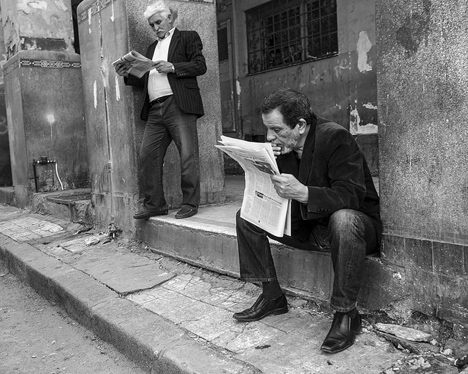
On political speech and the paradoxes of critique after Trump and Gaza; why the far right fills the gap left by restorationist liberalism; and how fascization depends on white middle-class solidarity.
Claiming free speech as a “Republican”, “French” or “western” value by conjuring a mythical pantheon of canonical Enlightenment figures will not help us build more inclusive societies. So says Arthur Asseraf, in reconsidering France’s track record as a beacon of press freedom.
The attacks on the Paris offices of Charlie Hebdo in January 2015 unleashed a maelstrom of debate about free speech and its limits in France and abroad. While some of this debate followed battle lines drawn in the 1980s during the controversy surrounding The Satanic Verses, this time it was even more symbolic for many because it was about France: beacon of the Enlightenment, birthplace of Voltaire, inventor of human rights. And now France was under attack from a new threat. Defending Republican values became the rallying cry of a march of almost four million people, who took to the streets throughout France on 11 January 2015. The government subsequently spearheaded a vast programme in schools to instil these values into the hearts and minds of the nation’s youth.

Reading the news, Algiers, March 2015. “Newspapers by and for Algerians only emerged timidly in the early years of the twentieth century”, writes Asseraf, “and there was no daily newspaper until independence in 1962”. Photo: Calvin Smith. Source:Flickr
Few have paused to consider whether Republican values might not be an unproblematic banner to rally behind. After all, the French Republic has ruled over large Muslim populations since the nineteenth century and was happy to deny them freedom of speech throughout the colonial period. Before we claim free speech as Republican, French or western value, it’s worth pausing and looking at the past.
France’s iconic law on the freedom of the press, still in force in 2015, was passed on 29 July 1881. At the time, it excluded the Republic’s Muslim subjects. While the law protected the rights of all French citizens, including explicitly those in Algeria and the colonies (Article 69), it did not protect the Republic’s subjects, the vast colonized populations throughout the French colonial empire. This was not a mere oversight: less than a month before, on 28 June 1881, the same parliament passed an equally iconic law on the indigénat (indigenous populations). Under the indigénat law, a bizarre parallel system of justice, indigenous populations could not speak against authority figures or gather freely in public, let alone publish newspapers. The indigénat law bypassed due process, required no trial, and involved a colourful variety of fines and punishments. Freedom of speech, like many other civil liberties, was put in place in France at the same time as it was denied to the majority of the Republic’s subjects abroad – those deemed to be members of races not yet ready for the full benefits of modern citizenship.
While the 1881 law excluded a variety of colonized subjects of various creeds throughout the French colonial empire in Africa and Asia, its Algerian context is particularly instructive because it specifically targeted Muslims. In colonial Algeria, citizens were defined as all those who were not Muslims (with a few exceptions). Muslim was a racialized legal category stripped of any religious significance. For instance, in a beautiful show of absurdity, several court cases confirmed that even if they converted to Christianity, indigenous populations remained legally Muslim, subject to discriminatory laws and deprived of citizenship.
Because Algeria was officially part of France, the law on the freedom of the press led to a unique situation whereby the small settler population, along with Algerian Jews naturalized as French citizens in 1871, developed a bustling newspaper industry free to publish more or less whatever they wanted, vociferously criticizing the government at any opportunity. Muslims, on the other hand, were subject to censorship and official intimidation: newspapers by and for Algerians only emerged timidly in the early years of the twentieth century and there was no daily newspaper until independence in 1962. Any Muslim who voiced (let alone wrote) any criticism of even the most minor corrupt official risked internment or deportation without trial.
After an extremely brutal war of conquest, Muslims, “a conquered people” could not be trusted to speak freely, lest they organize against France. The famous 1905 law on the separation of church and state was also meant to be applied to Algeria but never was. The French state continued to appoint and control imams until independence in 1962.
In short, the emergence of French freedom of the press occurred at the same time as the violence, Islamophobia and racism of colonialism. France has never been an unproblematic beacon of press freedom, especially when it comes to Muslims. The problem in colonial Algeria was not the failure of Muslims to integrate with Republican values. It was precisely the opposite: the construction of French laws prevented Muslims from speaking freely and these same laws were still in force in metropolitan France in 2015. It was thus strange to see the debate after the Charlie Hebdo attacks unfold in the French and international press as a debate over “integration” and “the compatibility of Islam and the Republic”. Before we ask Muslims for proof of their adherence to the values of free speech, it’s worth remembering that in the past those values were invoked to exclude them.
None of this history explains the horrific events of January 2015. The Kouachi brothers may have been of Algerian descent, but they were born in Paris and trained in Yemen. In their self-propagandizing they never mentioned colonialism or Algeria, issues which fascinate intellectuals much more than jihadis. Remembering this history does not give the killers excuses – it is a way of defeating them, by reminding ourselves that this is not a conflict between a pure France and a retrograde Islam.
As we struggle to respond to this massacre and to find a definition of free speech appropriate for our times, we will have to come to terms with the past uses of free speech to exclude and control certain populations. Claiming free speech as a “Republican”, “French” or “western” value by conjuring a mythical pantheon of canonical Enlightenment figures will not help us build more inclusive societies.
Published 20 May 2015
Original in English
First published by Free Speech Debate, 14 May 2015
Contributed by Free Speech Debate © Arthur Asseraf / Free Speech Debate / Eurozine
PDF/PRINTSubscribe to know what’s worth thinking about.

On political speech and the paradoxes of critique after Trump and Gaza; why the far right fills the gap left by restorationist liberalism; and how fascization depends on white middle-class solidarity.

Education has become another battleground in the Kremlin’s campaign to militarize the Russian public consciousness. Youth organizations, book bans, changes to school curricula – all amount to a ‘special anthropological operation’.